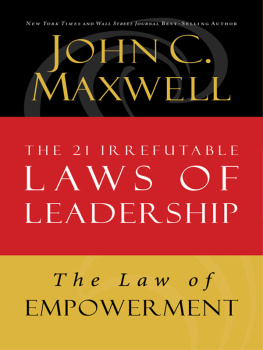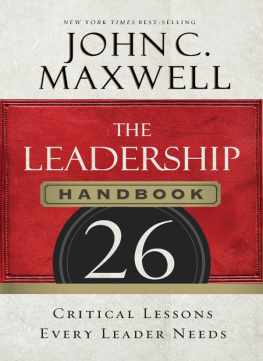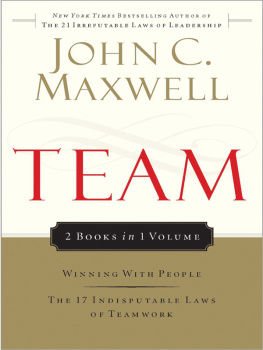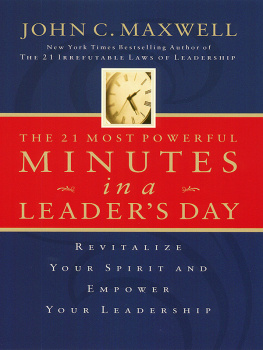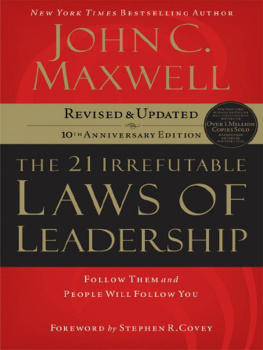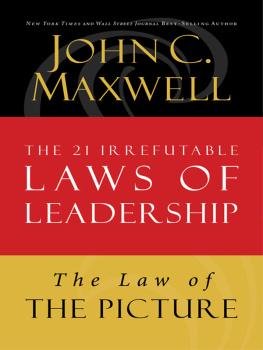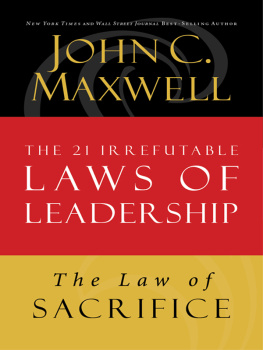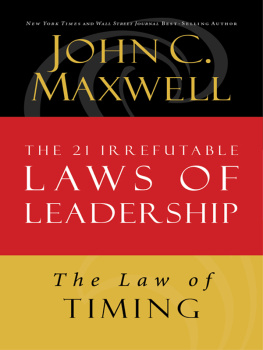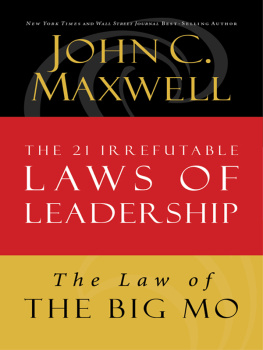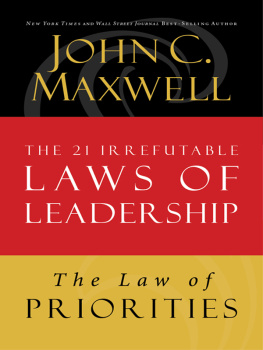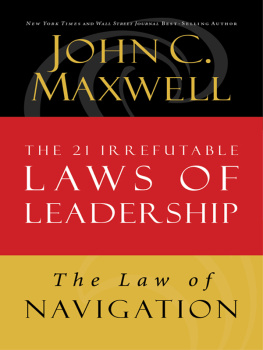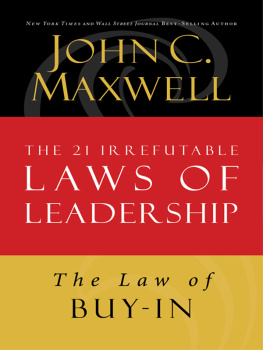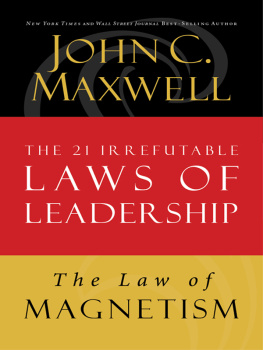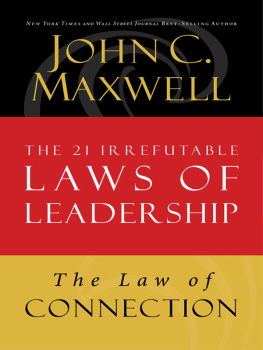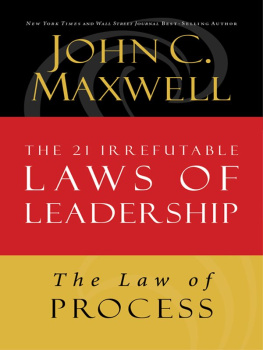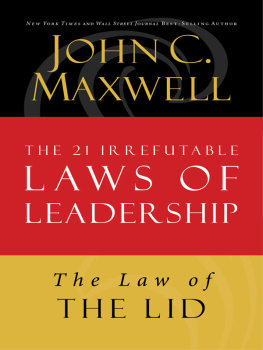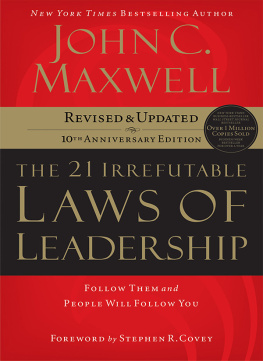
1998 and 2007 by John C. Maxwell
This ebook is derived from The 21 Irrefutable Laws of Leadership, by John Maxwell, 1998 and 2007 by Maxwell Motivation, Inc., a Georgia corporation.
All rights reserved. No portion of this book may be reproduced, stored in a retrieval system, or transmitted in any form or by any meanselectronic, mechanical, photocopy, recording, scanning, or otherexcept for brief quotations in critical reviews or articles, without the prior written permission of the publisher.
Published in Nashville, Tennessee, by Thomas Nelson. Thomas Nelson is a trademark of Thomas Nelson, Inc.
Thomas Nelson, Inc. titles may be purchased in bulk for educational, business, fund-raising, or sales promotional use. For information, please e-mail SpecialMarkets@ThomasNelson.com.
Published in association with Yates & Yates, LLP, Attorneys and Counselors, Orange, California.
Scripture quotations noted CEV are from THE CONTEMPORARY ENGLISH VERSION.
1991 by the American Bible Society. Used by permission.
Scripture quotations noted The Message are from The Message: The New Testament in Contemporary English. 1993 by Eugene H. Peterson.
ISBN 978-0-7852-7431-5 (HC)
ISBN 978-1-4185-3831-6 (ebook)
ISBN 978-1-4002-7571-7 (ebook of Chapter 12)

This book is dedicated to Charlie Wetzel, my writing partner since 1994. Together weve written more than forty books, and Ive enjoyed our collaboration on every one. As I have labored to add value to others by identifying and teaching leadership principles, Charlie, you have added value to me and my efforts. Your insights and skills as a wordsmith have been enjoyed by millions of readers. As a result, you have made a greater impact on more people than has anyone else in my inner circle. For that I thank you.
CONTENTS


Thank you to the thousands of leaders around the world who learned and sometimes challenged the laws of leadership, thus sharpening my thinking.
Thank you to the team at Thomas Nelson who gave me the chance to revise and improve this book, and especially to Tami Heim for her strategic leadership and to Victor Oliver who was instrumental in the development of the original concept.
Thank you to Linda Eggers, my executive assistant, and her assistant, Sue Caldwell, for their incredible service and willingness to go the extra mile every day.
Thank you to Charlie Wetzel, my writer, and Stephanie, his wife, with-out whose work this book would not have been possible.

Only Secure Leaders Give Power to Others
Nearly everyone has heard of Henry Ford, the revolutionary automobile industry innovator and legend in American business history. In 1903, he cofounded the Ford Motor Company with the belief that the future of the automobile lay in putting it within the reach of the average American worker. Ford said,
I will build a motorcar for the multitude. It will be large enough for the family but small enough for the individual to run and care for. It will be constructed of the best materials, by the best men to be hired, after the simplest designs that modern engineering can devise. But it will be so low in price that no man making a good salary will be unable to own oneand enjoy with his family the blessings of hours of pleasure in Gods great open spaces.
Henry Ford carried out that vision with the Model T, and it changed the face of twentieth-century American life. By 1914, Ford was producing nearly 50 percent of all automobiles in the United States. The Ford Motor Company looked like an American success story.
A LESS-KNOWN CHAPTER OF THE STORY
However, all of Fords story is not about positive achievement, and one reason is that he didnt embrace the Law of Empowerment. Henry Ford was so in love with his Model T that he never wanted to change or improve itnor did he want anyone else to tinker with it. One day when a group of his designers surprised him by presenting him with the prototype of an improved model, Ford furiously ripped its doors off the hinges and proceeded to destroy the car with his bare hands.
For almost twenty years, the Ford Motor Company offered only one design, the Model T, which Henry Ford had personally developed. It wasnt until 1927 that he finallygrudginglyagreed to offer a new car to the public. The company produced the Model A, but it was incredibly far behind its competitors in technical innovations. Despite its early head start and the incredible lead over its competitors, the Ford Motor Companys market share kept shrinking. By 1931, it was down to only 28 percent, a little more than half of what it produced seventeen years earlier.
Henry Ford was the antithesis of an empowering leader. He continually undermined his leaders and looked over the shoulders of his people. He even created a sociological department within Ford Motor Company to check up on his employees and direct their private lives. As time went by, he became more and more eccentric. He once went into his accounting office and tossed the companys books into the street, saying, Just put all the money we take in in [sic] a big barrel and when a shipment of material comes in reach into the barrel and take out enough money to pay for it.
Perhaps Fords most peculiar dealings were with his executives, especially his son Edsel. The younger Ford had worked at the company since he was a boy. As Henry became more eccentric, Edsel worked harder to keep the company going. If it werent for Edsel, the Ford Motor Company probably would have gone out of business in the 1930s. Henry eventually gave Edsel the presidency of the company, but at the same time he undermined his son. Further, whenever a promising leader was rising up in the company, Henry tore him down. As a result, the company kept losing its best executives. The few who stayed did so because they figured that someday old Henry would die, and Edsel would finally take over and set things right. But thats not what happened. In 1943, Edsel died at age forty-nine.
ANOTHER HENRY FORD
Edsels oldest son, the twenty-six-year-old Henry Ford II, quickly left the navy so that he could return to Dearborn, Michigan, and take over the company. At first, he faced opposition from his grandfathers entrenched followers. But within two years, he gathered the support of several key people, received the backing of the board of directors (his mother controlled 41 percent of Ford Motor Companys stock), and convinced his grandfather to step down so that he could become president in his place.
Young Henry was taking over a company that hadnt made a profit in fifteen years. At that time, it was losing one million dollars a day ! The young president knew he was in over his head, so he set out to find leaders. Fortunately, the first group actually approached him. Colonel Charles Tex Thornton headed a team of ten men who had worked together at the War Department during World War II. Their contribution to Ford Motor Company was substantial. In the years to come, the group produced six company vice presidents and two presidents.
Next page
